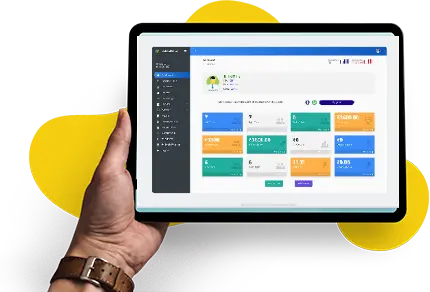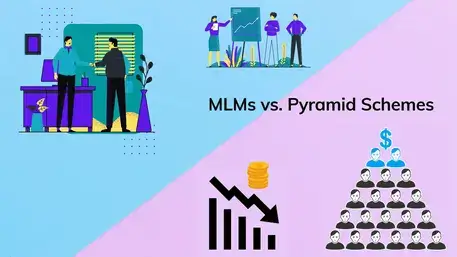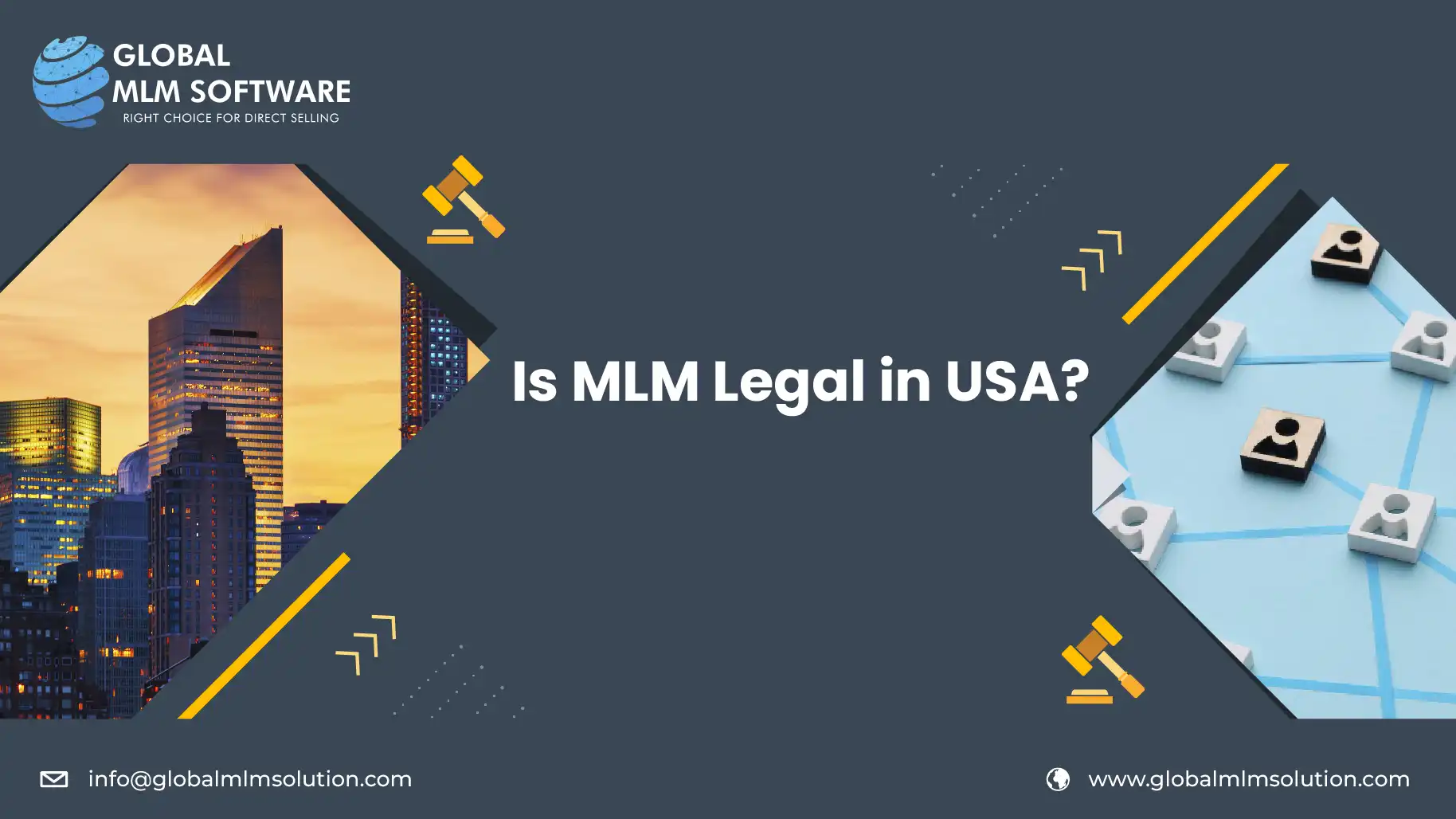We always mention that compliance isn’t just a box to tick; it’s a duty and opportunity to build a trustworthy relationship with distributors and customers.
As an MLM business owner, you strive to remain truthful to your customers and distributors at all times. You display your products accurately, publish the correct earnings claims, and have scientific research backing your products, and still, non-compliance can occur.
It's not only you, but your distributors as well need to comply with MLM laws. Therefore, MLM distributor compliance is an integral part of overall compliance efforts.
In this article, we will explain how your distributors can work within the legal parameters and what you can do from your end to ensure that.
This Article Contains:
What is MLM Distributor Compliance?
MLM distributor compliance refers to the laws and regulations that MLM distributors must follow to ensure the MLM business’s compliance with regulatory requirements.
These rules are to ensure that distributors sell products at fair prices to real end customers by providing them with accurate product details without exaggerated claims.
For instance, a distributor selling hair care products claims that your hair growth will boost just after using the product for a week. However, there’s neither any scientific backing nor does the company claim the same. When the customer uses the product and the results don’t match the claim, it is considered a non-compliance activity.
Though the company was not involved directly, it is bound to provide a refund and take action against the distributor for making such claims. If the company ignores such cases, it can come under the Federal Trade Commission’s (FTC) scrutiny.
Core Requirements for MLM Distributor Compliance
The Federal Trade Commission considers distributors as the MLM business’s agents. Therefore, when a distributor makes an exaggerated claim, forces others to join the business, or misguides customers, it’s the complete responsibility of the MLM business.
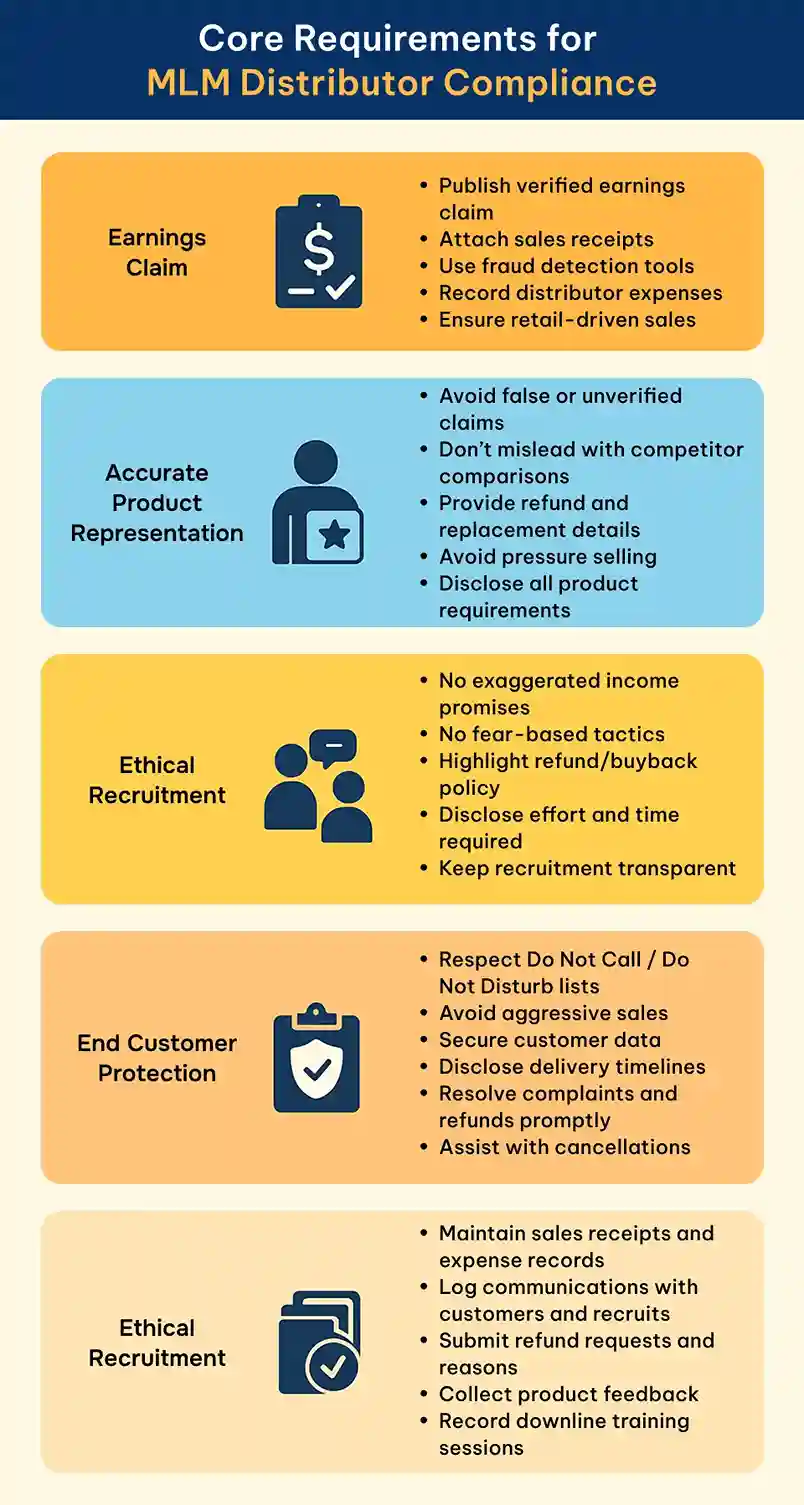
So, what are the steps that your distributors must take to ensure MLM distributor compliance? We’ll discuss them all in detail now.
1) Submit Proper Earnings Claim
Publishing and making the earnings claim document available to everyone is necessary for an MLM business. The earnings mentioned must be calculated by taking all your distributors into consideration.
For a thorough understanding, you can go through our infographic on how to create an earnings claim document.
Software such as Global MLM Solution can automatically calculate individual earnings as per the sales made by each distributor.
However, a business needs to ensure that these sales are true and only made to people who require the product.
The Statement of the Federal Trade Commission, FTC v. Herbalife International of America, Inc., July 15, 2016 case, mentions that the order requires “compensation is calculated based upon verifiable retail sales.” and “Herbalife to verify, through receipts and other reliable methods, that its business is driven by retail sales and that at least 80% of its sales are made to legitimate end-users.”
So, it’s necessary to attach the sales receipt along with each sale. Many MLM businesses make it a mandatory condition to release the payout, and we recommend it too.
To ensure that sales receipts are genuine, you need to implement AI-powered fraud detection tools such as PDFChecker.
Here are some primary indicators that a distributor is submitting fake sales receipts:
Bulk submission of sales receipts from the same date or with consistent date patterns (like 5 sales every day for the entire month).
Suspicious payment methods.
Customer details appear to be fake names; most of the people are new customers and not repurchasers.
Identical customer details, such as phone number or address.
Sudden sales spikes at bonus qualification deadlines.
When you detect false sales receipts, you must take immediate action against the distributor, requesting that they correct the submissions.
If this detection doesn’t take place at this stage, it will happen when FTC audits each detail.
The first part is done, where distributors submitted accurate sales receipts. However, there’s more that distributors need to do; they need to submit the expenses as well.
How will they do that? That could be tricky, but you can have a checklist or a form that distributors need to fill out.
After expenses are submitted, individual earnings are calculated (earnings = total sales - expenses). And finally, a compliant earnings claim document is made.
To help you with the expenses, we have created a form that you can integrate into your MLM efforts.
Let the Distributors Play Their Role
Identify Accurate Earnings by Recording Expenses, Not Just Sales.
Download Expense Details Form2) Accurate Product Representation
Distributors need to represent products correctly, whether explaining to prospects or potential recruits.
Let’s go through the pointers distributors need to follow while conversing with prospects:
Don’t make claims that are not backed by scientific research.
Don’t give a “number” of people who use a product regularly if statistics are not based on surveys.
Distributors must not compare their products with competitors’ in a misleading or defamatory way, which works as a deal-breaker for the prospect.
Never mention that the product is available for a “limited time,” and put pressure on the prospect to make a quick decision.
If the product requires an additional purchase to function as expected, let the customer know upfront before the purchase is made.
Never push customers to purchase more than they need.
Give accurate details of refund and replacement policies so that the customer can make a balanced decision.
Apart from the above-mentioned points, distributors need to take care of some additional points while dealing with potential recruits:
Don’t mention that a product is easy to sell, even if you have sold an immense number of units. Not everyone is the same.
Don’t provide twisted details regarding the commission associated with the product.
Never encourage potential customers to buy in bulk quantities; let the new distributor decide for themselves.
By staying within the boundaries set by these pointers, your distributors will stay safe from making non-compliant comments related to your products.
3) Ethical Recruitment Practices
Besides product representation, there are some other aspects where distributors need to ensure ethical recruitment practices.
Recruitment brings the biggest compliance challenge in the MLM industry, as not only companies but also their distributors are directly involved in it.
To ensure no compliance issue takes place from the distributor’s end, here are some steps that they must follow:
Must not make exaggerated claims such as “earn quick money” or “replace your full-time job” to attract potential recruits.
Must not promise guaranteed income and should show the earnings claim document to provide prospects with a realistic idea.
Must not downplay the effort, time, and expenses required to earn a reasonable income.
Never use “fear-based” tactics to force sign-ups.
Emphasizing recruitment over retail sales as a way of earning is a big NO.
There should not be any hidden charges levied on the person who accepts the business opportunity.
Honestly, highlight the refund and buyback policy, transparently displaying terms and conditions.
Give information regarding the support provided in terms of material, training, etc., but also let prospects know what they need to do on their own.
When distributors follow these guidelines and all transcripts are saved as proof of compliance, regulatory risks are minimized.
4) End Customer Protection
Many of your end customers will buy products directly from your company, and many will buy them via a distributor. Therefore, the customer experience highly depends on the distributor's conduct.
We already mentioned how they can stay fair and true to customers while representing the products, but that’s not it.
From the initial conversation to post-sales service, distributors need to protect the end customer.
Let’s consider that the conversation was fruitful and the customer showed interest in the product. Afterwards, whenever distributors take follow-up, the conversation should comply with the Telemarketing and Consumer Fraud and Abuse Prevention Act and Telemarketing Sales Rule.
It starts with taking the prospects’ consent for sharing the product details and taking follow-ups. Along with that, they must respect “Do Not Call” and “Do Not Disturb” lists and avoid contacting prospects outside of permitted hours.
Distributors must not be aggressive in their approach, which forces prospects into buying products they don’t even need.
The customer data received in the process should be kept securely and must not be used for unrelated purposes.
Before the product is bought, the distributor should let the customer know about the delivery time, and should notify the customer if there’s going to be any delay.
When the product is received, the distributor should be available to provide the assistance required in using it and clear up any confusion. Overall, the customer must not feel cheated after making the purchase.
If there are any complaints that can’t be solved at the distributor level, the distributor must pass them on to the company, and quick action should be taken.
In case the product performance doesn’t match the claims and a refund request is made, the distributor should promptly look into it and process the genuine cases.
Similarly, when an MLM business follows a subscription model and the customer wants to cancel the subscription, the distributor must guide them throughout the process rather than convincing them to continue with the product.
The distributor can provide the discount or provide an alternative, but if the customer refuses to go forward, no more subscription charges must be levied.
Additionally, when a customer has a negative experience and they wish to post it in the public domain, distributors should not threaten them with legal action.
5) Record Keeping Practices
Before we dive into the section, we’d like to clarify that these are the record-keeping requirements from the distributor’s end.
Sales receipts and expense records were two of the reporting requirements that we discussed earlier. However, there’s more to add so that you can track your distributors' activities better, identify if there’s any non-compliant conduct, and take action to correct it. It also helps you develop a transparent audit trail for authorities.
Communication details with Customers, Potential Recruits, and Downlines: Make it mandatory for distributors to submit all the communication records, whether it’s email, text, media files, or phone call transcripts. You can create a portal where distributors can submit the details.
Customer Refund Requests and Reason: Whenever a customer makes a refund request and you forward the claim, a copy of the request and its reason should be submitted. It informs the business if the refund is a result of a non-compliance activity.
Product Feedback: Whatever product feedback is shared by customers, positive or negative, should be shared with the MLM business. Positive feedback can be used to back up the authenticity, while negative feedback can be used to identify compliance issues and strengthen the efforts.
Downline Discussion and Training Records: It’s not only your MLM business that trains the distributors. Many sponsors conduct training sessions for their downlines, highlighting sales methods, addressing compensation plan queries, or communication tactics. Though the MLM company doesn’t play a direct role in these sales, it still holds the responsibility. Therefore, training session transcripts or videos should be submitted, and the MLM business must analyze them to ensure MLM distributor compliance.
Legal Guidelines for MLM Distributors
Though there are no straightforward MLM distributor regulatory guidelines, there are laws and regulations that the entire MLM business needs to follow. These rules, then, apply to distributors as well, as they are a part of the MLM business.
Usually, MLM businesses create an internal policy document and share it with distributors. Distributors are bound to follow the policy as per their agreement with the MLM business.
The policy is created based on the following legal guidelines:
Accurate product representation: Must not make false, exaggerated, or unverified claims about the product. The product benefits should be supported by evidence and approved by governing authorities.
Truthful income claims: Distributors must not promise guaranteed earnings or use misleading phrases like “get-rich-quick” while recruiting new distributors. They must show a transparent picture of the income opportunity backed by the company’s earnings claim document.
Do not conduct anti-pyramidal activities: Distributors should focus on selling their products to end customers and not their recruits.
Marketing and advertising standards: Distributors should only use marketing material that’s approved by the company and must introduce themselves as distributors and not the company’s employees.
Customer protection: Provide receipts whenever sales are made and honor honest refund requests.
Data privacy and communication: Always protect customer and downline data, and do not use communication means for conversations unrelated to sales.
Best Practices for Maintaining MLM Distributor Compliance
So far, we have discussed the compliance efforts that your distributors need to make.
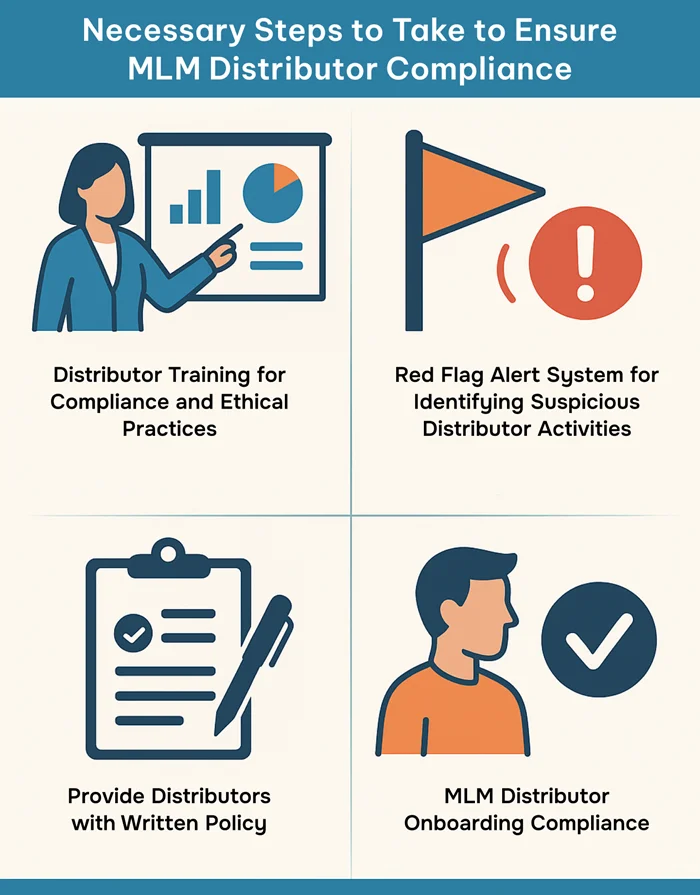
Now, we can move forward to the best practices you can take as part of your MLM distributor compliance strategy.
1) Distributor Training for Compliance and Ethical Practices
The Federal Trade Commission mandates that MLM businesses conduct training programs for distributors to keep them aware of the laws and regulations.
Under the MLM distributor compliance training program, you must cover:
Details of the FTC guidelines.
Communication practices to ensure compliance with the telemarketing rules provided under the guiding acts.
Product details and descriptions that distributors need to follow.
Guidance on recruitment practices as per the points we mentioned under the “Ethical Recruitment Practices” section.
Compliance duties that they need to follow.
2) Red Flag Alert System for Identifying Suspicious Distributor Activities
Even after you conduct the training, you can’t rely on good faith. Compliance issues can even occur without distributors’ knowledge. For instance, when a text that seems exaggerated, a recruitment practice that appears to be a grey area, a refund request that got missed, etc. These mistakes can be committed by any distributor.
To highlight these issues and take necessary action against them, there must be a 360-degree red flag alert system in place that keeps track of every distributor's activity.
A unified alert system must undertake the following tasks:
Go through sales receipts and detect if there are any abnormal patterns.
Check that all receipts are true and not manipulated.
Check the genuineness of distributor expenses.
Analyze submitted transcripts, messages, and emails to ensure that they lie within the legal boundaries.
Detecting the abnormal distributor behavior, such as rapid purchase of inventory, huge same-day sales, mass recruitment, etc.
Find compliance issues in multiple distributors working under the same “team leader.”
3) Provide Distributors with Written Policy
Before a distributor joins, their upline or MLM business must provide them with a written MLM compliance policy document.
The policy document should clearly outline:
Do’s and don’ts regarding product representation, communication, and recruitment.
Duties to undertake to ensure compliance.
Training requirements to stay updated with the MLM laws and regulations.
It helps distributors in guiding their conduct and knowing what’s expected of them.
Besides the policy, a formal agreement must be in place, requiring the distributor to acknowledge and comply with all company rules and regulations.
By signing the agreement, the distributor confirms that:
Have read and understood the compliance policy.
Agree not to engage in misleading, deceptive, or unethical practices.
Accept responsibility for following applicable laws.
Commit to representing the company’s products and income opportunities truthfully.
MLM Distributor Onboarding Compliance
While onboarding a distributor, companies need to fulfill their compliance requirements to ensure ethical execution of direct selling activities.
Identity verification and KYC for MLM distributors: Collect necessary documents such as government-issued ID, address proof, and tax details. Check their authenticity and only onboard real distributors, avoiding the business’s exploitation.
Agreement and contract signing: There must be a contract between the company and distributor, outlining responsibilities and restrictions. The distributor must sign the contract and also agree to the company’s code of conduct.
Training and education: MLM businesses must conduct compliance training and provide awareness regarding product representation and income claims.
Transparent compensation disclosure: Make distributors familiar with bonuses, rewards, and the entire compensation plan, and provide realistic earnings expectations.
Data privacy and consent: Collect and store every distributor’s information securely, and obtain consent before proceeding with the data collection.
Cooling-off period: Allow new distributors to reconsider and cancel their agreement within a defined period.
Common Distributor Compliance Challenges and Solutions in MLM
Distributor compliance in MLM doesn’t come without challenges. Whether it’s regarding making claims, fraudulent tactics, or improper customer handling, the MLM business needs to implement solution steps to overcome these loopholes. Otherwise, all MLM distributor compliance efforts will go in vain.
1) False and Misleading Product Claims
Challenge: The distributor makes false or misleading claims, which don’t align with the MLM business’s policies.
Solution: Provide pre-approved marketing material, mandate product training, and request customer transcripts to ensure compliant conversations.
2) Exaggerated Income Promises
Challenge: Some distributors will make claims like “you can leave your job and earn more by making fewer efforts” to grow their downline.
Solution: Ensure that income claims become a part of training and make it mandatory for distributors to share the income claims document with potential recruits before they make the final decision. To put an additional check, add the point that “the distributor has read the income claims document and understands the income opportunity” in the contract.
3) Focus on Recruitment Over Sales
Challenge: When distributors prioritize recruitment instead of product sales, it appears similar to pyramid schemes.
Solution: Identify how distributors are exploiting the compensation plan, plug the gaps, and improve the structure to reward genuine product sales only.
4) Poor Understanding of Legal Requirements
Challenge: Even after providing the training, many distributors are left with a poor understanding of their legal requirements.
Solution: Include a mandatory test before the training certification that distributors need to pass in order to start sales activities.
5) Improper Customer Handling
Challenge: Distributors fail to provide sales receipts, avoid their customer service duties, and ignore refund requests.
Solution: Make it mandatory to submit sales receipts for each sale made. Introduce a customer grievance portal where customers can share their issues, which will be directly referred to distributors. Also, allow distributors to directly make the refund requests to the company for quicker action.
6) Inconsistent Enforcement
Challenge: When companies ignore violations, it encourages distributors to perform more non-compliant activities, and discourages those who follow the rules truthfully, ultimately degrading the compliance culture.
Solution: Apply compliance rules consistently across all distributors, implement digital systems that mandate enforcement, and hold people accountable when action is not taken.
What if a Distributor Performs Non-Compliant Activity?
Even after immense efforts, it’s natural to encounter compliance errors. However, what’s not acceptable is ignoring them till the FTC highlights them.
Therefore, identifying, documenting, and correcting the errors is important to stay safe from penalties and reputation damage.
Once a non-compliance activity is detected, follow these steps:
Step 1: Immediate Investigation
Review the incident details, such as what’s the exact issue, how it took place, the parties involved, and its impact. One must also identify whether it was intentional conduct or a genuine mistake.
Step 2: Corrective Measures
Based on the investigation, direct your distributor to take corrective measures and ensure that customers or recruits impacted are compensated or refunded as per the intensity of non-compliance.
Step 3: Action on Distributor
If the distributor has made a genuine mistake, share compliance training and request to complete it before moving forward with sales. Also, request their upline to make them familiar with compliance requirements and guide their conduct.
In case it's a fraudulent act or intentional conduct, freeze compensation and impose penalties as per the agreement. In case of major lapses or repeated violations, terminate the distributor.
Step 4: Record Keeping
The information regarding the entire incident, including:
The primary issue and its detection
Distributor and the parties involved
Customers impacted
The level of impact
Rectification measures implemented
Action taken on the distributor and other parties involved
When you record the information, the MLM business stands out as a responsible entity that keeps track of distributor activities and ensures the well-being of end customers.
Future Trends in Distributor Compliance in MLM
Overall, MLM compliance is evolving to create a safer and better environment for businesses operating fairly, distributors working effortlessly, and customers trusting wholeheartedly.
To ensure that none of the above-mentioned parties gets exploited, technology is empowering compliance.
MLM businesses are implementing AI-powered tools such as PDFChecker to scan the conversations between distributors and customers. These scans highlight red flags in conversations. Then, the compliance team checks those red flags and takes necessary actions.
Similar tools are implemented to go through distributors' social media pages to keep a check on what they claim regarding the product and income. When a claim doesn’t match the compliance policy, it gets highlighted, and corrective measures are implemented.
Distributors play an important role in creating a transparent audit trail. To prove that revenue comes from actual sales, receipts are checked thoroughly to ensure there are no abnormal patterns or forgery.
The entire audit trail is generated using tamper-proof records, aiding in proving authenticity at the time of need.
Moving forward, stricter data privacy monitoring systems are expected to be implemented where the customer data is entirely handled by businesses, bypassing distributors. It’s one of the essential aspects to strengthen compliance, as when the data is handled by multiple distributors, data leakage becomes likely.
MLM training programs are also getting improved as businesses are moving to interactive live sessions. Imparting information using role-based scenarios is another major trend.
Conclusion
Now, as you are familiar with MLM distributor compliance, it’s time to put compliance efforts into action.
Start by preparing a compliance policy document, getting the right software tools for compliance, and setting up the red flag alert system.
Once it is done, train your existing distributors, make them aware of the policy and their duties, and develop a compliance culture across the organization.
FAQs
1. What is the role of Technology in MLM distributor compliance?
Technology plays an important role in improving the MLM distributor compliance by automating KYC verification, providing onboarding with the necessary details, designing contracts specific to regions, tracking distributor activities, highlighting red flags, and following the enforcement of corrective measures.
2. Why is MLM distributor compliance important?
MLM distributor compliance ensures that distributors follow ethical practices, protect customers, and safeguard the business from legal penalties.
3. What are the most common compliance mistakes made by distributors?
Here are the following common compliance mistakes made by distributors:
Making exaggerated income or product claims
Using fake sales receipts
Aggressive or misleading recruitment tactics
Failing to honor refunds or cancellations
Not keeping proper records of sales and communication
4. Do MLM distributors need to keep sales records?
Yes, distributors need to maintain each sales record for MLM businesses to calculate genuine earnings.
5. How can distributors avoid making non-compliant claims?
They should only use company-approved product information, avoid promising guaranteed earnings, and ensure all statements are supported by facts or research.
Disclaimer: Global MLM Software does not endorse any companies or products mentioned in this article. The content is derived from publicly available resources and does not favor any specific organizations, individuals or products.



